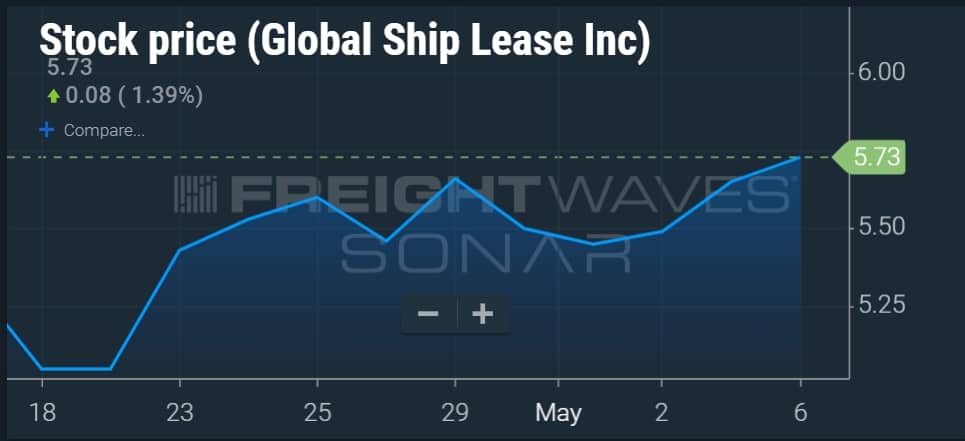Global Ship Lease (NYSE: GSL), a company that leases out mid-sized and smaller container ships, has reported improved earnings in its first full quarter since completing a transformative merger with Poseidon Containers.
GSL reported net income of $10.1 million in the first quarter of 2019 compared to net income of $4.2 million in the same period last year.
According to GSL executive chairman George Youroukos, “We have made substantial progress in extending our forward contract coverage and locking in contracted cashflow at a time when charter rates have shown significant improvement.”
Youroukos continued, “In particular, a recent surge of demand for high-reefer-capacity post-Panamax [larger than 5,000 twenty-foot-equivalent units or TEU] vessels has enabled us to secure profitable, multi-year charters for some of the older vessels in our fleet.”
During the first quarter, GSL sealed six new long-term charter agreements with liner companies – two with MSC, two with ZIM, one with Maersk and one with Hapag-Lloyd.
GSL, which went public in 2008, began its corporate life as a ship-leasing vehicle sponsored by French liner company CMA CGM. In its early years, its entire fleet was chartered to that carrier, which owned 44 percent of GSL.
On November 15, 2018, GSL concluded a transformational transaction with Poseidon Containers, a private Greek company led by Youroukos and backed by private equity group MAAS Capital.
GSL had 19 ships at the time of the merger, ranging from 2,207 to 11,040 TEU in capacity. Poseidon added 19 ships with capacities of 2,506 TEU to 9,115 TEU. The combination of the two fleets more than doubled total capacity, from 85,136 TEU to 198,803 TEU, and provided a much more diversified base of charter customers.
Following the merger – which was transacted in shares, not cash – former shareholders of Poseidon obtained a 69.5 percent economic interest in GSL, with Youroukos taking the helm of the board.
To put this in perspective, Poseidon backer MAAS Capital was just one of many private equity groups that invested in shipping assets in the wake of the 2008-09 financial crisis with the goal of going public as an exit strategy – but found that the shipping IPO window was closed.
There has been no initial public offering by a ship owner in the U.S. public market since June 2015. Poseidon Containers was planning an IPO in 2014, but ultimately pulled its registration filing.
Private equity groups have instead been opting for an alternative exit strategy, informally known as ‘IPO via M&A.’ Private equity-backed fleets are sold to already public companies in return for shares. The larger size of the combined entity theoretically equates to a public platform with higher trading liquidity, which should eventually allow the private-equity backers to sell out of their original positions.
This deal motivation can be seen in the sale of the Augustea Atlantic, Songa Bulk and E.R. Capital Holding fleets to Star Bulk (NASDAQ: SBLK); the sale of Navig8 Product Tankers to Scorpio Tankers (NYSE: STNG); the sale of the Quintana fleet to Golden Ocean (NASDAQ: GOGL); and the sale of the CarVal fleet to Goodbulk (NOTC: BULK).
The Poseidon-GSL transaction is another example of this broader ‘ships for shares’ movement in the public shipping space, a trend that is expected to continue.












